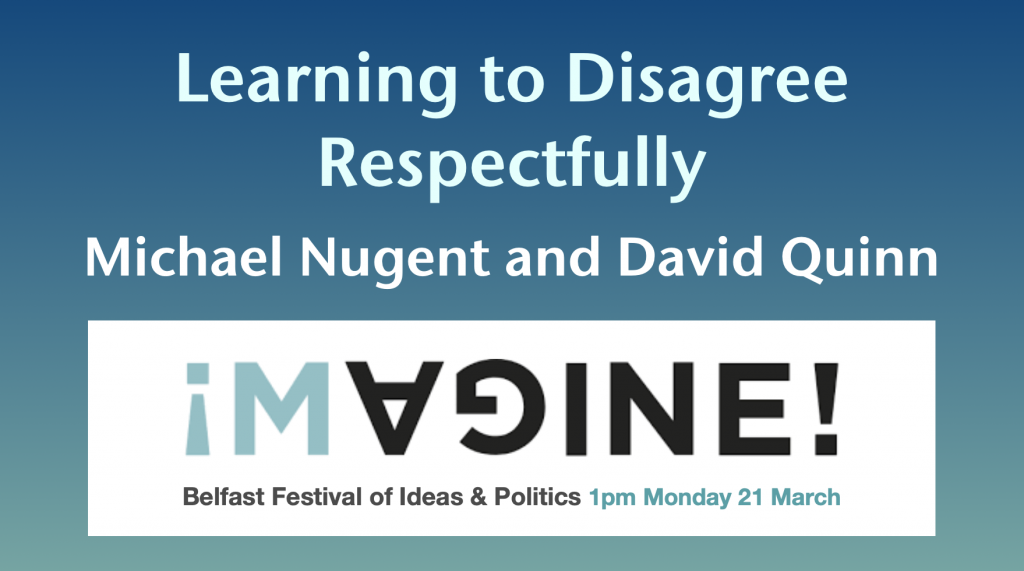
If you are in Belfast on Tuesday 21 March, I and David Quinn will be discussing how to disagree respectfully as part of the Imagine! Belfast Festival of Ideas & Politics. The event is at lunchtime in The Green Room at the Black Box on Hill Street, and you can book tickets here.
As a bonus, that evening, the wonderful John Otway will be doing a gig in the same venue!
Learning to disagree respectfully
Political disagreements today are increasingly hostile and abusive. This pattern is intensified by social media, where online rage drowns out nuanced discussion. Too many people gather in tribal bubbles, where they consider themselves to be good people and outsiders’ bad people. People on all sides of many issues promote what they believe to be good ideas using authoritarian methods and fail to understand why others sincerely disagree with them.
Michael Nugent and David Quinn want to help people move away from this type of politics. Michael is chairperson of Atheist Ireland, which promotes atheism and ethical secularism. David is director of the Iona Institute, which promotes the place of marriage and religion in society. They are typically on opposite sides of Ireland’s cultural and political debates. But they both agree we should focus on resolving issues, without being abusive to people who disagree with us.
Public discourse online is increasingly hostile and tribal. It started with shock-bloggers, got worse on Twitter, and has overflowed into politics and some mainstream media. This pattern is reinforced by the algorithms that social media companies use to keep people on their platforms. They promote hostile posts over reasonable ones, because hostile posts get more engagement. They lead to people gathering online with people they already agree with, where they can mutually reinforce their own beliefs as the ones they most commonly encounter.
In real life, on all sides of most issues, most people are promoting what they sincerely believe to be best for society, whether they are correct or mistaken. By contrast, a small number of people are acting in bad faith, and even fewer are inciting or engaging in violence or other crimes for which they should be prosecuted. Online discourse can create the opposite impression. The loudest voices caricature people on “our side” as promoting only truth and virtue, and people on “the other side” as malign bigots and haters. Many people on each side recognise the unfairness of the malign caricatures of themselves, even as they engage in similar rhetoric against others, who then feel the same.
For decades, liberals in Ireland campaigned against the censorship of the Catholic Church. Alongside these campaigns, John Hume led the primacy of dialogue over silencing to bring an end to decades of terrorism in Northern Ireland. Now that Ireland is becoming more liberal, we must protect open debate from secular as well as religious authoritarianism. Where there are competing claims of rights, we cannot simply argue that “our” conclusions are the only acceptable ones and are not up for debate. We should support everybody’s right to democratically promote beliefs we disagree with. We should encourage kindness, and challenge unlawful behaviour, while also highlighting that most people on all sides are acting in good faith.
Michael Nugent and David Quinn
Michael Nugent is a writer and activist. He chairs Atheist Ireland, which promotes atheism, reason, and an ethical, secular society. It led the successful campaign to remove the offence of blasphemy from the Irish constitution. It has special consultative status with the United Nations. After his late wife Anne Holliday died of cancer, Michael founded Right to Die Ireland with Tom Curran. He and Anne previously founded New Consensus, which campaigned against terrorism and for democracy in Northern Ireland. Michael has written several books, including the comedy bestseller Dear John: the John Mackay Letters; Ireland on the Internet: the Definitive Guide; and That’s Ireland: a Miscellany. He co-wrote the comedy musical I, Keano, which transformed Ireland’s world cup fiasco in Saipan into a mock-operatic melodrama.
David Quinn is a well-known journalist who specialises in religious and social affairs. He is a national newspaper columnist since 1994 and previously was editor of The Irish Catholic. He has written for The Sunday Business Post, The Irish Independent, and The Sunday Times. He frequently appears on radio and television programmes and has contributed to numerous magazines overseas. He has taken part in all major debates about Church and State over the past 30 years. Among those he has debated are Professor Richard Dawkins and Christopher Hitchens. He is the founder and head of The Iona Institute, which also takes part in debates about Church and State, the role of religion in society, the future of denominational education, the right-to-life and the family.